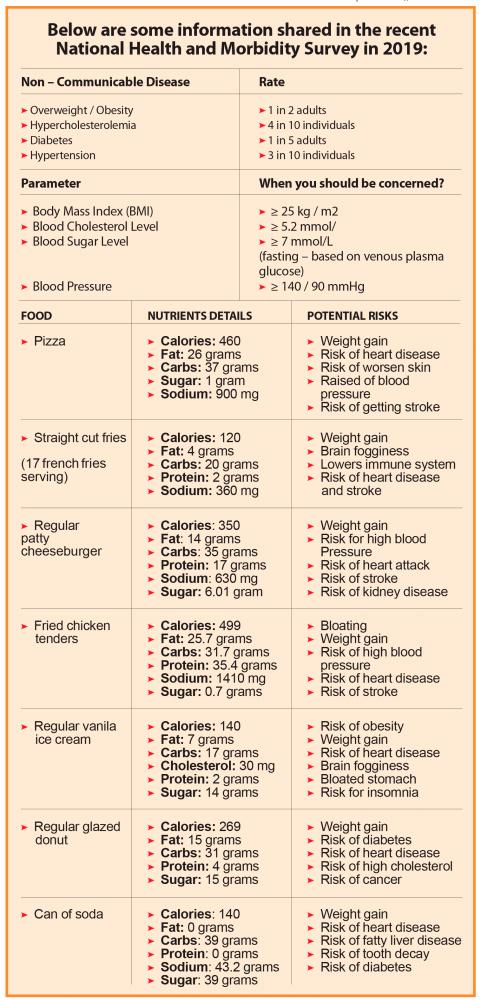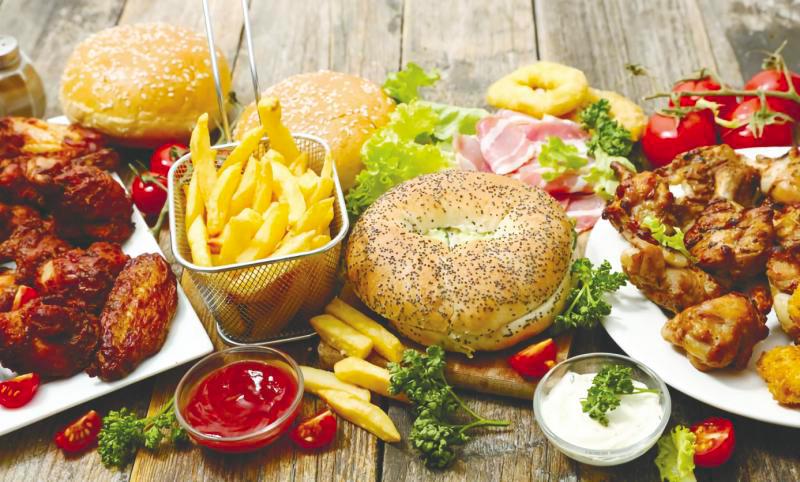NOTHING comes close to the feeling you get from munching on your favourite cheeseburger and fried chicken. Its heavenly taste and appetising smell are definitely among the many joys of life. In fact, it is what makes us often swing by our favourite fast food drive-thrus and savoury stores.
And reports have shown that Malaysians truly enjoy eating junk food and processed meals. Even before the pandemic, 87% of Malaysians were dining out in places like fast food joints, street food stalls, diners and cafes. And we even continued to patronise them when the nation was struck by Covid-19.
According to a Rakuten Insight survey, 76% of Malaysians were ordering fast food daily via food delivery apps. And this is alarming considering the various detrimental effects that can come from consuming fast food and processed meals. From obesity to diabetes, these unhealthy meal options can do a number on your health.
Darsheka Wanithasan, a certified nutritionist, can attest to this statement. The weight management counsellor has helped numerous individuals reach their ideal weight by educating them on healthy eating habits and ways to stay active.

“I have always been passionate about promoting public health and wellness since I was a teenager. Hence I ended up in this field. Food is a basic necessity of our lives and we cannot live without it. Therefore, I believe that it is crucial for us to take control of our health by primarily improving our eating habits,” she said.
Given Darsheka’s professional expertise and passion in the matter, BUZZ decided to chat with her about the hidden dangers of consuming fast food and processed bites. Apart from that, we also touched on the ways we can incorporate healthier food options into our diet.
How would you define fast food and processed food?
“Fast food simply refers to food that is prepared and served quickly and is usually processed. Whereas processed food, according to the Academy of Nutrition, is specifically defined as food that has been cooked, canned, frozen, packaged or changed in nutritional composition through fortifying, preserving or preparing in different ways.”
Following the findings of the Rakuten Insight survey, why do you think people enjoy eating specifically fast food so much?
“In my opinion, I think most people enjoy eating fast food as they are flavourful, usually inexpensive and convenient to the public. In fact, they are easily available in dine-in restaurants, by drive-thru, and delivery.”

Various studies have proven that fast food and processed food are detrimental to our health. Could you elaborate on what some of the effects are on our health?
“Fast food or processed food can most definitely be detrimental to our health in the long run especially when taken too frequently. As they are generally higher in calories, taking too much can result in weight gain.
“In addition to that, they are also usually high in saturated fats, refined carbohydrates and sodium, which can typically cause other non-communicable diseases such as hypercholesterolemia, diabetes and hypertension.
“With regards to non-communicable diseases in Malaysia, below are some information shared in the recent National Health and Morbidity Survey in 2019:

“However, the frequency of fast food consumption does matter here! One does not immediately develop the aforementioned complications upon consumption. It is built up over time when one is not cautious of the amount and frequency of consuming these foods.
“It is therefore extremely important to regularly get a health check-up done and to look out for the following symptoms.”

Are there healthier and more delicious alternatives to fast food and processed food?
“There are many healthier alternatives to improving fast food consumption. The first step would be to downsize a meal when opting for fast food. Go for a smaller meal and request for an unsalted version of fries, less sauce and plain water on the side instead of the usual heavy sauce and sugary beverages.
“Other than that, we can choose to make our own burgers at home for instance, using wholemeal or wholegrain burger buns, actual chicken pieces instead of a processed patty, and top them up with lots of fresh vegetables!
“It is totally okay to add a little mustard, hummus or salsa to replace the usual sweet sauces for a juicy texture. Remember to use healthier cooking methods such as baking, grilling or air-frying instead of deep-frying.
“If time is a constraint, one may opt to purchase their meals at restaurants that offer healthier options of similar meals.”

How can we help cultivate an environment that promotes healthy eating?
“We all play a role in cultivating an environment that promotes healthy eating. I personally believe that this works best by tackling younger children first so that they grow up to become healthy adults. It is important that parents get their children involved in meal prepping activities that are attractive.
“For instance, preparing balanced meals from home, adding lots of colourful fruits and vegetables or even making meals in the shapes of animal faces to make mealtimes more interesting.
“On a larger scale, the government can help do the same by ensuring healthier food options are sold at school canteens and workplaces as children and adults spend most of their time in these places.”










